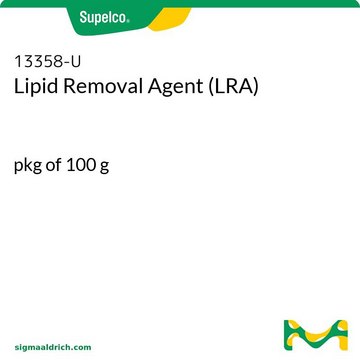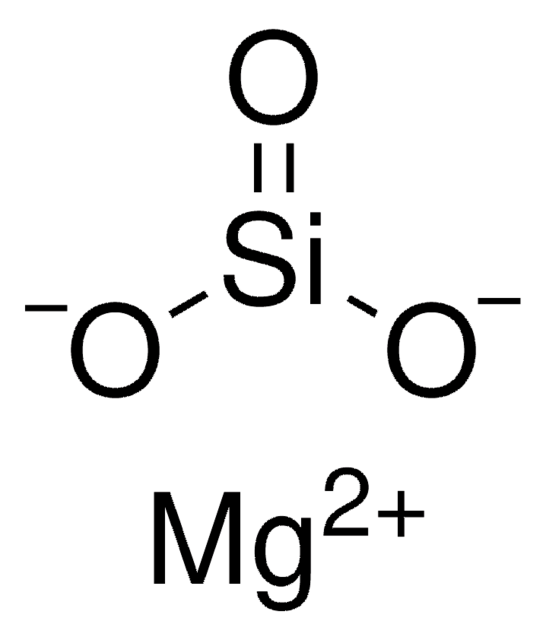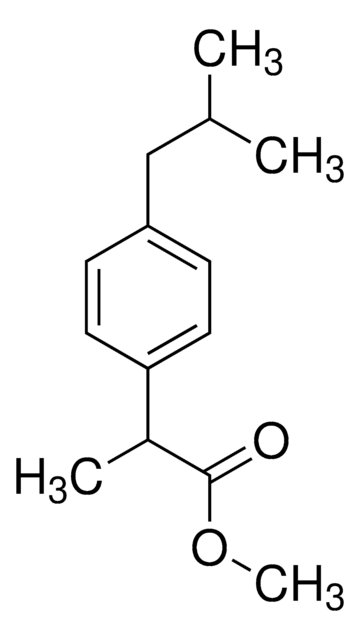13360-U
Lipid Removal Agent (LRA)
pkg of 500 g
Synonyme(s) :
polymeric adsorbent, XAD-2
Se connecterpour consulter vos tarifs contractuels et ceux de votre entreprise/organisme
About This Item
Produits recommandés
Qualité
reagent grade
Niveau de qualité
Forme
powder
Conditionnement
pkg of 500 g
Technique(s)
LPLC: suitable
Superficie
120 m2/g
Matrice
Silica
Groupe de la matrice active
silica
Taille des particules
325 mesh
Dimension de pores
90 Å mean pore size
Description générale
LRA, the synthetic adsorbent of crystalline calcium silicate hydrate is used for removing lipids and endotoxin from plasma or aqueous solutions. It is also used for DNA purification to remove protein, RNA and genomic DNA.
Application
- Lipid removal agent (LRA) was used for absorption of lipids using gel permeation chromatography.
- LRA was used to isolate lipoprotein particles from coeluting proteins in collected fraction from Gel filtration chromatography.
Code de la classe de stockage
11 - Combustible Solids
Classe de danger pour l'eau (WGK)
WGK 1
Point d'éclair (°F)
Not applicable
Point d'éclair (°C)
Not applicable
Équipement de protection individuelle
dust mask type N95 (US), Eyeshields, Gloves
Faites votre choix parmi les versions les plus récentes :
Déjà en possession de ce produit ?
Retrouvez la documentation relative aux produits que vous avez récemment achetés dans la Bibliothèque de documents.
Les clients ont également consulté
Anita Krisko et al.
PLoS genetics, 9(9), e1003810-e1003810 (2013-09-27)
Although the genome contains all the information necessary for maintenance and perpetuation of life, it is the proteome that repairs, duplicates and expresses the genome and actually performs most cellular functions. Here we reveal strong phenotypes of physiological oxidative proteome
Anita Krisko et al.
Genome biology, 15(3), R44-R44 (2014-03-04)
The genetic code is redundant, meaning that most amino acids can be encoded by more than one codon. Highly expressed genes tend to use optimal codons to increase the accuracy and speed of translation. Thus, codon usage biases provide a
Scott M Gordon et al.
Journal of proteome research, 9(10), 5239-5249 (2010-08-20)
Plasma levels of high density lipoprotein cholesterol (HDL-C) are inversely proportional to the incidence of cardiovascular disease. Recent applications of modern proteomic technologies have identified upward of 50 distinct proteins associated with HDL particles with many of these newly discovered
John P Zhang et al.
Biotechnology progress, 21(4), 1220-1225 (2005-08-06)
A synthetic adsorbent of crystalline calcium silicate hydrate, the product LRA by Advanced Minerals Corp., has been studied for endotoxin removal from aqueous solutions. This adsorbent removes endotoxin effectively, and the removal is greatly enhanced by the presence of an
Stephen W C Chung et al.
Journal of chromatography. A, 1218(33), 5555-5567 (2011-07-12)
Organochlorine pesticide (OCP) residues in foods have been of concern for several decades. However, the analysis of some of the OCPs and their metabolites or derivatives, such as endrin aldehyde, endrin ketone, nonachlor, etc. in fatty foods (including foods of
Notre équipe de scientifiques dispose d'une expérience dans tous les secteurs de la recherche, notamment en sciences de la vie, science des matériaux, synthèse chimique, chromatographie, analyse et dans de nombreux autres domaines..
Contacter notre Service technique







